
Horses is the debut studio album by American musician Patti Smith. It was released by Arista Records on November 10, 1975. A fixture of the mid-1970s underground rock music scene in New York City, Smith signed to Arista in 1975 and recorded Horses with her band at Electric Lady Studios in August and September of that year. She enlisted former Velvet Underground member John Cale to produce the album.

Bat Out of Hell is the 1977 debut album by American rock singer Meat Loaf and composer Jim Steinman. The album was developed from a musical, Neverland, a futuristic rock version of Peter Pan, which Steinman wrote for a workshop in 1974. It was recorded during 1975–1976 at various studios, including Bearsville Studios in Woodstock, New York, produced by Todd Rundgren, and released in October 1977 by Cleveland International/Epic Records. Bat Out of Hell spawned two Meat Loaf sequel albums: Bat Out of Hell II: Back into Hell (1993) and Bat Out of Hell III: The Monster Is Loose (2006).

A New World Record is the sixth studio album by Electric Light Orchestra (ELO). It was released on 15 October 1976 on United Artists Records in the U.S., and on 19 November 1976 on Jet Records in the United Kingdom. A New World Record marked ELO's shift towards shorter pop songs, a trend which would continue across their career.

Sticky Fingers is a studio album by the English rock band the Rolling Stones. It was released on 23 April 1971 on the Rolling Stones' new label, Rolling Stones Records. The Rolling Stones had been contracted by Decca Records and London Records in the UK and the US since 1963. On this album, Mick Taylor made his second full-length appearance on a Rolling Stones album. It was the first studio album without Brian Jones, who died two years earlier. The original cover artwork, conceived by Andy Warhol and photographed and designed by members of his art collective, the Factory, showed a picture of a man in tight jeans, and had a working zip that opened to reveal underwear fabric. The cover was expensive to produce and damaged the vinyl record, so the size of the zipper adjustment was made by John Kosh at ABKCO records. Later re-issues featured just the outer photograph of the jeans.

The Head on the Door is the sixth studio album by English rock band the Cure. It was released on 30 August 1985 by Fiction Records. Preceded by the single "In Between Days" which had reached No. 15 on the UK Singles Chart, The Head on the Door was described by Melody Maker as "a collection of pop songs". With its variety of styles, it allowed the group to reach a wider audience in both Europe and North America. In the United Kingdom it became their most successful album to date, entering the albums chart at No. 7 on 7 September.

Soldier is the fourth studio album by American rock singer Iggy Pop. It was released in February 1980 by record label Arista.
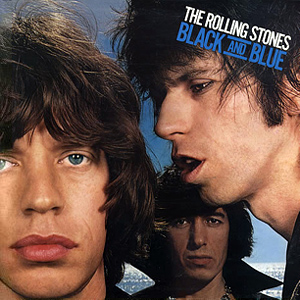
Black and Blue is a studio album by the English rock band the Rolling Stones, released on 23 April 1976 by Rolling Stones Records.

Some Girls is a studio album by the English rock band the Rolling Stones, released on 9 June 1978 by Rolling Stones Records. It was recorded in sessions held from October 1977 to February 1978 at Pathé Marconi Studios in Paris and produced by the band's chief songwriters – lead vocalist Mick Jagger and guitarist Keith Richards – with Chris Kimsey engineering the recording.
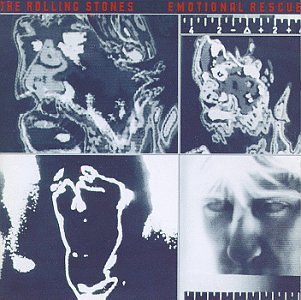
Emotional Rescue is a studio album by English rock band the Rolling Stones, released on 23 June 1980 by Rolling Stones Records. Following the success of their previous album, Some Girls, their biggest hit to date, the Rolling Stones returned to the studio in early 1979 to start writing and recording its follow-up. Full-time members Mick Jagger (vocals), Keith Richards (guitar), Ronnie Wood (guitar), Bill Wyman (bass) and Charlie Watts (drums) were joined by frequent collaborators Ian Stewart (keyboards), Nicky Hopkins (keyboards), Bobby Keys (saxophone) and Sugar Blue (harmonica).
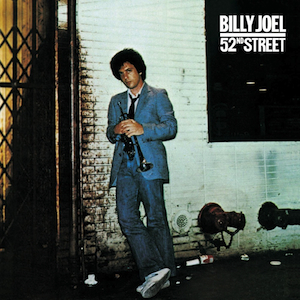
52nd Street is the sixth studio album by American singer-songwriter Billy Joel, released on October 11, 1978 by Columbia Records. Presenting itself as the follow-up to his breakthrough studio album, The Stranger, Joel tried to give the new album a fresh sound, hiring various jazz musicians to differentiate it from his previous studio albums.

Stage Fright is the third studio album by Canadian–American group the Band, released in 1970. It featured two of the group's best known songs, "The Shape I'm In" and "Stage Fright", both of which showcased inspired lead vocal performances and became staples in the group's live shows.
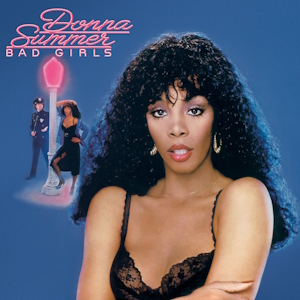
Bad Girls is the seventh studio album by American singer-songwriter Donna Summer. It was released on April 25, 1979, by Casablanca Records. Originally issued as a double album, Bad Girls became the best-selling and most critically acclaimed album of Summer's career. It was also her final studio album for Casablanca Records. In 2003, Universal Music re-issued Bad Girls as a digitally remastered and expanded deluxe edition.

Bob Dylan at Budokan is a live album by American singer-songwriter Bob Dylan, released August 1978 on Columbia Records in Japan only, followed by a worldwide release in April 1979. It was recorded during his 1978 world tour and is composed mostly of the artist's "greatest hits". The performances in the album are radically altered from the originals, using the same musicians that played on Street-Legal, but relying on a much larger band and stronger use of woodwind and backing singers. In some respects the arrangements are more conventional than the original arrangements, for which the album was criticized. For a few critics, such as Janet Maslin of Rolling Stone, the differences between the older and newer arrangements had become less important.

Easter is the third studio album by American musician Patti Smith, and the second release where her backing band Patti Smith Group is billed. It was released in March 1978 by Arista Records. Produced by Jimmy Iovine, the album is regarded as the group's commercial breakthrough, owing to the success of the rock single "Because the Night", which reached number 13 on the Billboard Hot 100 and number five on the UK Singles Chart.

Eat to the Beat is the fourth studio album by American rock band Blondie, released on September 28, 1979, by Chrysalis Records. The album was certified Platinum in the United States, where it spent a year on the Billboard 200. Peaking at No. 17, it was one of Billboard's top 10 albums of 1980. It also reached No. 1 on the UK Albums Chart in October 1979 and has been certified Platinum by the British Phonographic Industry (BPI).
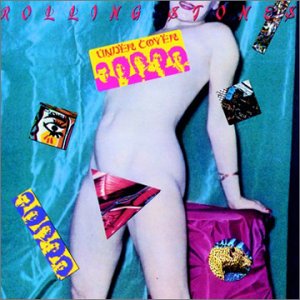
Undercover is a studio album by English rock band the Rolling Stones, released on 7 November 1983 by Rolling Stones Records. The band would move the label to Columbia Records for its follow-up, 1986's Dirty Work.

Radio Ethiopia, the second studio album by Patti Smith, and her first album to credited as Patti Smith Group. The album was released in October 1976 through Arista Records.
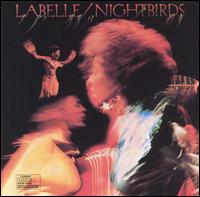
Nightbirds is an album by the all-female singing group Labelle, released in 1974 on the Epic label. The album features the group's biggest hit, the song "Lady Marmalade," and it became their most successful album to date.

Ivan Kral was a Czech-born American composer, filmmaker, guitarist, record producer, bassist, and singer-songwriter. He worked across genres including pop music, punk rock, garage rock, rock, jazz, soul, country and film scores. His music has been recorded by such artists as U2, Téléphone, Patti Smith, Iggy Pop, David Bowie, Simple Minds, and John Waite, among others. The Czech three-time Andel Awards winner died of cancer in 2020, aged 71.
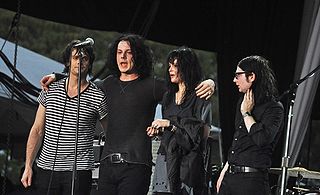
The Dead Weather is an American rock supergroup, formed in Nashville, Tennessee in 2009. Composed of Alison Mosshart, Jack White, Dean Fertita and Jack Lawrence. The Dead Weather debuted at the opening of Third Man Records' Nashville headquarters on March 11, 2009. The band performed live for the first time at the event, immediately before releasing their debut single "Hang You from the Heavens".




















